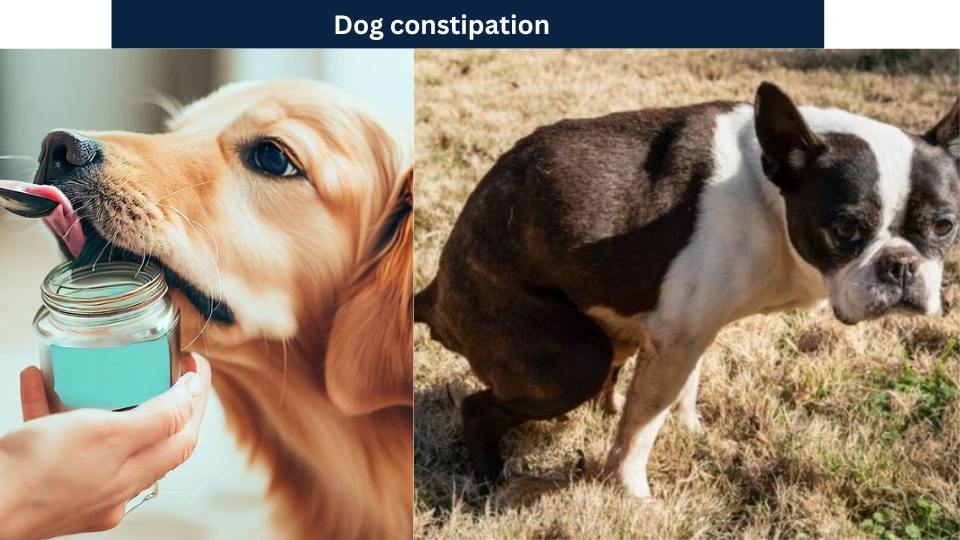Last Updated on March 13, 2024 by Aftab Tariq
Dog constipation is not exactly the obstacle you anticipate when you become a dog owner, but it is a problem you will likely encounter at some point. For this reason, we advise learning about the symptoms, the reasons, and the actions you may take to ease your dog’s misery.
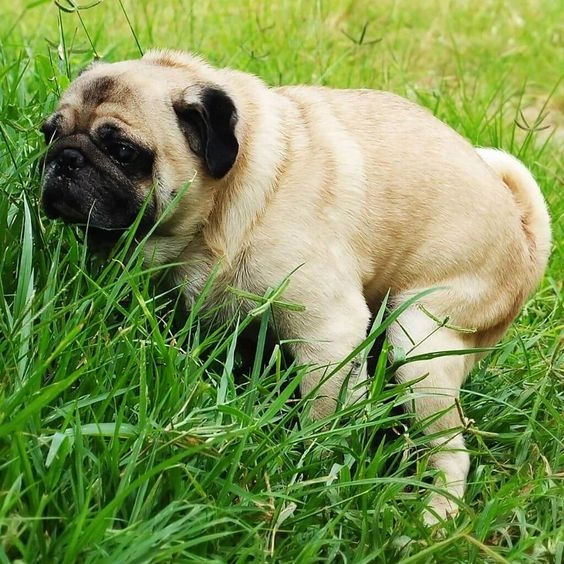
Constipation is a common health issue in dogs that results from an inability to pass a regular stool regularly. Some dogs may experience persistent constipation; however, this is usually easily treatable and can occur for various reasons.
Obstipation may result from this, in which case the dog cannot pass faeces, and the stool gets firmer, drier, and compacted. In this auricle, we will discuss how to make a constipated dog poop quickly and dog constipation treatment.
Causes Of Dog Constipation
During regular digestion, peristaltic waves are an involuntary muscular movement that pushes the waste down the intestines and into the colon, rich in water and electrolytes. The water is absorbed in the colon, and the waste is expelled as stools.
The colon will continue to absorb water if this process is slowed down or interfered with, which could cause the stool to become firmer, drier, and possibly compacted. Dog constipation can have several frequent reasons, some of which include:
1: Not getting enough exercise
2: Eating a poor diet or suddenly changing diets
3: Not having enough fibre in their food
4: Swallowing non-food items like garbage, bones, gravel, or plants that block the intestines
5: Grooming too much, which can cause hair to build up in their poop?
6: Getting older
7: Having a condition called hypothyroidism
8: Facing kidney problems
Dog Constipation Symptoms
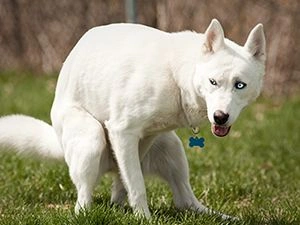
- Source : Pinterest
- When a dog is constipated, they might show these signs:
- Not pooping for a few days
- Having hard, pebble-like poop
- Trying to poop but not getting much out
- Feeling uncomfortable or in pain
- Having a tough time pooping
- Seeing mucus or blood in their poop
Constipation can happen to any dog, but it’s more common in older ones. Sometimes, they don’t have enough electrolytes or kidney issues. Older male dogs might also get constipated because their prostate is too big.
Complications Of Dog Constipation
When your dog gets constipated, and you don’t treat it, it can become a worse condition called obstipation. That means the poop in their colon gets dry and hard, making it stuck and unable to come out. This makes the colon get too full, causing a problem called megacolon.
Your dog’s belly might get big, and they might feel tired and not want to eat. They could have trouble pooping and might even throw up. These problems can get really serious and might need help from the vet, like surgery or getting the poop removed manually, which is called de-obstipation.
Taking out the entire poop at once might be hard, so your dog might need to go through it more than one time, which can be expensive and need them to be put to sleep. That’s risky for their health.
How To Treat Dog Constipation At Home?
Constipation that flares up sometimes can be readily managed at home with small lifestyle changes. A home cure might help relieve your dog’s constipation but consult your veterinarian first. Constipation may indicate more significant health issues. You might attempt the following natural dog constipation treatment at home to help your dog feel better if they are constipated:

Pumpkin for dog constipation: Pumpkin puree is made from pumpkin, which is good for dogs because it has lots of fibre and water. It helps their digestion work smoothly. Make sure it’s pure pumpkin puree without adding sugar or spices. Don’t use pumpkin pie filling because it’s not good for dogs. You can give your dog pumpkin puree straight from the can, and they’ll enjoy it as a tasty treat.
Coconut oil for dog constipation: Coconut oil functions similarly to olive oil in helping your dog’s stool become softer naturally. A spoonful or two added to your dog’s food will aid in lubricating the digestive system.
Additionally, coconut oil’s antibacterial and antimicrobial qualities can support your dog’s digestion and gut health. Additionally, inflammation and constipation frequently go hand in hand, and coconut oil has inherent anti-inflammatory properties.
Canned dog food: Their digestive tract will be more balanced, and their faeces will be softer due to the softer meals and greater moisture content. To prevent upset stomachs, blend canned food with their regular diet.
By increasing the amount of fibre in their diet, dietary fibre supplements will assist in controlling and softening their stool and bowel movements. Consult your veterinarian about the best kinds and amounts of vitamins for your dog.
They stay properly hydrated when they have access to fresh water. It is essential to promote frequent water consumption in your dog. Get veterinary attention if they aren’t drinking anything at all.
Milk for dog constipation: Using milk as a home remedy is a common suggestion, but it’s not recommended. Dr. Bullen says,
“Milk might aid in passing stool, but this is due to some dogs’ lactose intolerances causing diarrhea, which can lead to dehydration.”
Since many dogs are lactose intolerant, milk can lead to diarrhoea rather than relieve constipation. This can exacerbate health issues rather than solve them.
Olive Oil: Wondering how much olive oil for dog constipation? Well, olive oil is like a helper for your pup’s health. Mixing into their food can make their digestion smoother and make stool softener! But remember, only a small amount is good. If you use too much or give it too often, your dog might have diarrhoea instead of relief.
Exercise: To encourage a healthy bowel movement and get your dog moving, take them on lengthy walks. Running, fetching, and chasing are excellent exercises that support a healthy digestive system.
Treatment For Constipation In Dogs
Your veterinarian can suggest adjustments or alternative therapies for severe or persistent constipation. These could consist of:
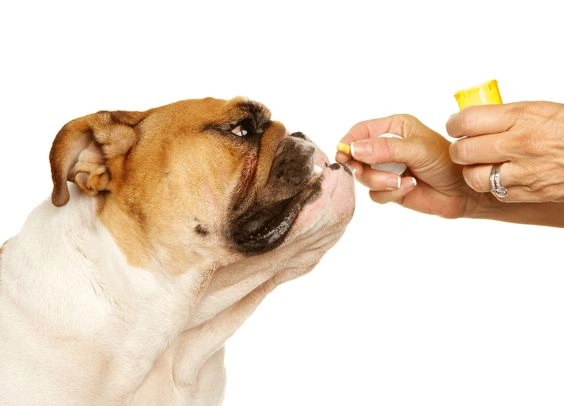
Enemas for dogs: Your dog may have discomfort from enemas. Pushing this surgery on your dog is not recommended, as most canines will not accept it. Furthermore, if administered incorrectly, enema solutions can be poisonous to dogs and result in harm. It’s crucial to let your veterinarian handle these treatments if necessary.
Dog laxatives: Consult your veterinarian before feeding your dog a laxative solution. Laxative solutions can become dangerous with prolonged usage and other situations like dehydration.
Low-residue diet: A low-residue diet is frequently preferable when treating chronic constipation over the long run. With this food, your dog could absorb more nutrients and have less waste going through the colon.
Compared to a long-term high-fiber diet, this could be preferable. Fibre draws water from the intestines and, over time, may make constipation worse. Typically, your veterinarian is the only place to get this kind of diet. For severe cases of constipation, further treatment options could be:
- If there is damage to the colon, remove it manually
- Drugs that inhibit enzymes
- Medicines that stimulate the nerves
- Operation
When To See A Veterinarian?
If your dog is circling often, scooting their bottom on the ground, squatting often, or crying out in pain, they might be constipated. Also, if they struggle to poop or only produce small stools with water or mucus, they could be constipated, even if it looks like diarrhoea.
You can gently press on your dog’s tummy to see if it feels hard or painful.
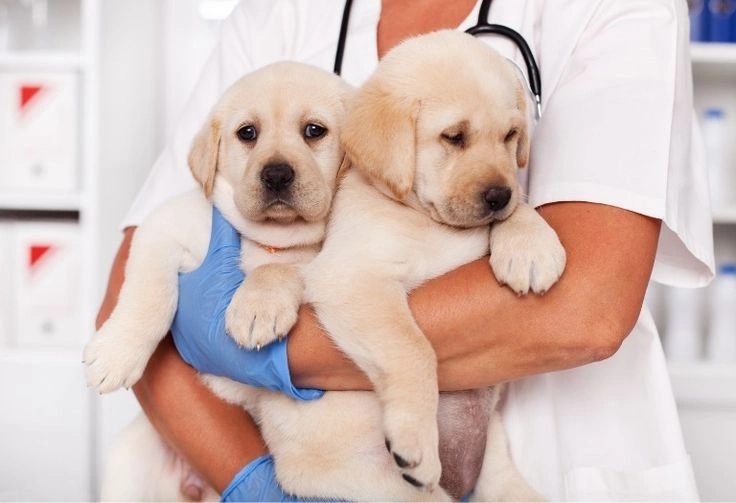
Keep an eye on your dog’s pooping habits. Usually, constipation goes away within 48 hours if your dog drinks enough water, exercises, and eats well. However, call the vet as soon as possible if it doesn’t get better, your dog seems uncomfortable, or it throws up. When you go to the vet, tell them:
- When your dog last had a normal poop
- What the poop looks like and if it’s different
- Any changes in diet or routine
- If your dog ate anything unusual
- Any medications your dog takes
- If your dog got hurt
- If they strain or seem painful when trying to poop
- If they’re showing signs of distress like vomiting, being tired all the time, or having a swollen belly
The vet will check your dog for anything unusual, like lumps, foreign objects, or a big colon. They might need to do blood tests, X-rays, or ultrasounds to figure out why your dog is constipated. Then, they’ll decide on the best way to help your dog feel better.
Frequently Asked Question
What Is Dog Constipation?
Dog constipation occurs when there is an infrequent or difficult passage of stool or faeces, often resulting in temporary discomfort. Many constipated dogs may strain or experience pain when trying to defecate.
How Can I Keep My Dog From Being Constipated Again?
Your vet may suggest a therapeutic diet, supplements, or medication based on the cause to prevent dog constipation recurrence. While unfamiliar foods or objects often trigger it, lifelong treatment may be needed for some dogs to maintain regular bowel movements.
Source
Dog Constipation: Causes, Diagnosis & Treatment
I am a dedicated content writer with more than five years of experience, particularly skilled in the art of storytelling. My writing journey commenced during my college years, where I pursued journalism and unearthed my talent for creating captivating narratives.

